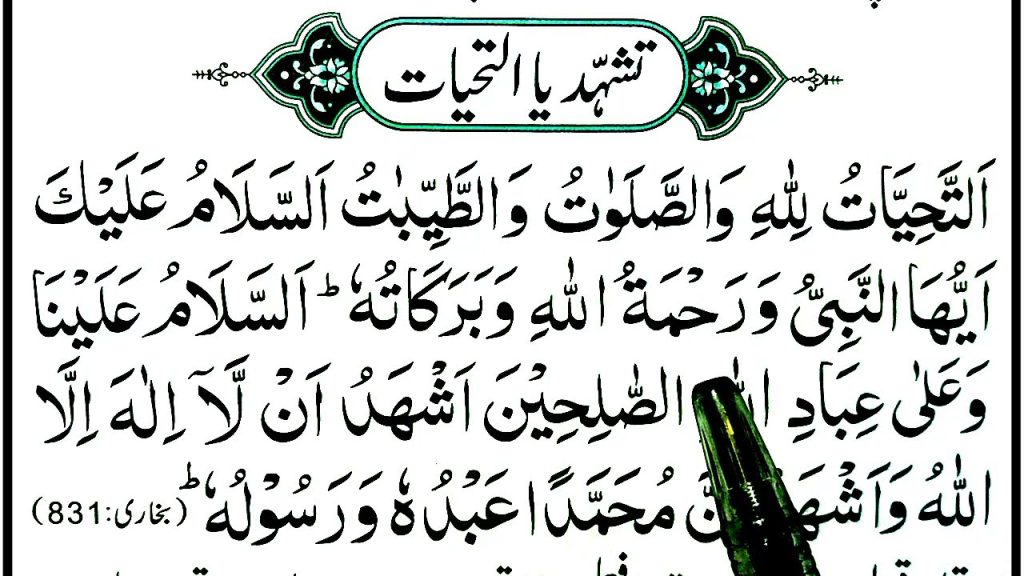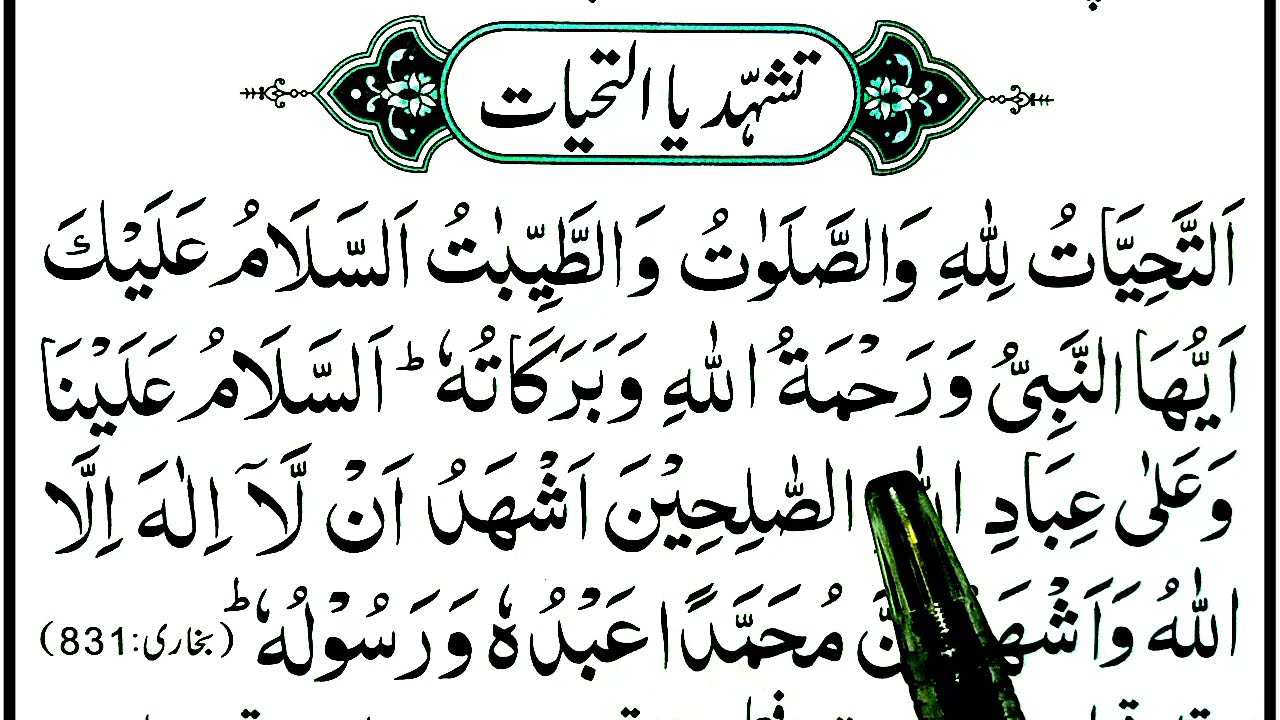Attahiyat Dua:
Meaning, Significance & How to Recite It in Salah
The Attahiyat Dua (تَحِيَّات) holds a deep and spiritual significance in Islam, recited during the sitting of Salah (prayer). Understanding its meaning, how to pronounce it, and its importance can enhance your prayer experience. In this post, we’ll delve into the full Attahiyat dua, its translation in English and Urdu, its spiritual impact, and how it strengthens the connection between a Muslim and Allah.

What is Attahiyat Dua?
The Attahiyat Dua is recited in the middle of Salah during the sitting, particularly in the second and final sittings (Tashahhud). It is a declaration of belief and an expression of peace and blessings on Prophet Muhammad ﷺ. The Attahiyat dua serves as an essential part of the prayer and is often memorized by Muslims from a young age.
The attahiyat dua is derived from the Hadith and is a way for Muslims to renew their faith in Allah. It holds significance because it reflects the connection between a believer and their Creator. The word “Attahiyat dua” comes from Arabic, meaning “greetings” or “salutations.”
Attahiyat Dua in Arabic

Here’s the full Attahiyat Dua in Arabic:
التحيات لله، والصلاوات والطيبات، السلام عليك أيها النبي ورحمة الله وبركاته، السلام علينا وعلى عباد الله الصالحين، أشهد أن لا إله إلا الله وحده لا شريك له، وأشهد أن محمداً عبده ورسوله.
Attahiyat Dua Translation in English
Attahiyat dua is a powerful expression that Muslims recite during their prayer. Here’s the translation of Attahiyat Dua in English:
“Greetings, prayers, and pure words are for Allah. Peace be upon you, O Prophet, and the mercy of Allah and His blessings. Peace be upon us and upon the righteous servants of Allah. I bear witness that there is no god but Allah, and I bear witness that Muhammad is His servant and messenger.”
Attahiyat Dua Translation in Urdu
Here’s the translation of the Attahiyat Dua in Urdu:
“تمام سلام، دعائیں اور پاکیزہ کلمات اللہ کے لیے ہیں۔ اے نبی، آپ پر اللہ کی رحمت اور برکات ہوں۔ ہم پر اور اللہ کے صالح بندوں پر سلام ہو۔ میں گواہی دیتا ہوں کہ اللہ کے سوا کوئی معبود نہیں، اور میں گواہی دیتا ہوں کہ محمد ﷺ اللہ کے رسول ہیں۔”
Importance of Attahiyat Dua in Salah
The Attahiyat dua is recited as a reminder of our connection with Allah. During Salah, the believer expresses their submission to Allah and acknowledges His greatness. The Attahiyat Dua emphasizes the importance of peace, blessings, and love towards the Prophet Muhammad ﷺ.
Every Muslim recites Attahiyat dua in their prayer to remember that Salah is a conversation with Allah. It is a time to make du’a (supplication) and seek Allah’s mercy and guidance. Understanding the meaning of the Attahiyat Dua can enhance the depth of your Salah, leading to more focus and devotion during prayer.
The Two Versions of Attahiyat Dua
In Salah, there are two versions of Attahiyat Dua. The first is a shorter version that is recited after the second rak’ah, and the second, longer version, which includes Salawat Ibrahimiyya (blessings on the Prophet Ibrahim ﷺ), is recited in the final sitting of the prayer.
- Short Attahiyat: Recited after the second rak’ah (includes only Attahiyat).
- Long Attahiyat: Recited in the final rak’ah, adding the salawat (blessings) for Prophet Ibrahim ﷺ.
Both versions are integral parts of Salah, and learning both allows a Muslim to complete their prayer with the appropriate supplications.
How to Recite Attahiyat Dua Correctly
The proper recitation of the Attahiyat dua requires clear pronunciation and focus. Muslims should aim to pronounce each word correctly, paying attention to the Harakat (diacritical marks) that guide the pronunciation of each letter.
Tips for Correct Recitation:
- Listen to Recitations: Use audio tools or apps that provide clear recitations for learning the correct pronunciation.
- Repeat Often: Repetition is key to memorizing the Attahiyat Dua.
- Reflect on Its Meaning: Take time to understand the words you’re reciting, not just mechanically repeat them.
Spiritual Benefits of Reciting Attahiyat Dua
The Attahiyat dua holds immense spiritual value, offering several benefits for the believer:
- Connection with Allah: It reinforces the believer’s relationship with Allah and Prophet Muhammad ﷺ.
- Peace and Tranquility: It instills calmness and serenity, especially during moments of stress.
- Faith Reinforcement: Repeating the Attahiyat Dua helps in the renewal of one’s belief in Allah.
Attahiyat Dua for Children and New Muslims
Teaching children or new Muslims the Attahiyat Dua is an essential step in their religious education. It is recommended to start with small sections, practicing pronunciation and meaning. Parents can create interactive activities, such as:
- Visual aids: Using charts or flashcards with the Attahiyat Dua in Arabic, along with translation.
- Repetition: Allow children to memorize the dua by repeating it often, making it a fun activity.
- Praise: Rewarding children for memorizing the dua encourages them to learn and appreciate the importance of prayer.
Attahiyat Dua FAQs
Q1: Is it mandatory to recite the Attahiyat Dua in Salah?
Yes, it is an essential part of Salah. It must be recited during the sitting of prayer, both in the second and final rak’ah.
Q2: Can I recite the Attahiyat Dua in English if I don’t know Arabic?
It is important to try to memorize the dua in Arabic. However, newcomers can initially recite the meaning in English as they work on learning the Arabic version.
Q3: Is there a specific time to recite Attahiyat dua?
The Attahiyat dua is recited after the second rak’ah and during the final sitting of Salah (in the last rak’ah).
Conclusion:
The Spiritual Power of Attahiyat Dua
The Attahiyat Dua is a cornerstone of every Muslim’s prayer. It’s a declaration of faith, peace, and respect for the Prophet Muhammad ﷺ. By understanding its meaning and reciting it with sincerity, Muslims draw closer to Allah, experience tranquility in their prayers, and strengthen their connection with the Prophet ﷺ. Whether you’re learning this dua for the first time or simply seeking a deeper understanding, keep reciting Attahiyat dua and experience its profound spiritual benefits in your daily prayers.

AoA, my name is Abd al-Rahman, and my vision is to spread the knowledge of the Quran to everyone. I am proud and tall while standing as your trusted mentor on the journey of learning and memorizing the Holy Quran. I, along with a committed team of Islamic teachers, am bound to provide an easy online facility for Islamic studies and Hifz programs.

